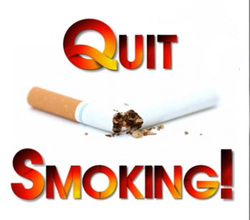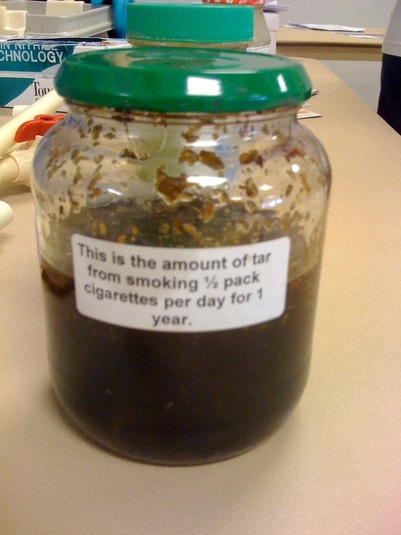Why should you quit now?
Most smokers say they want to quit. So how do you move from wanting to quit to actually quitting? A great start is to find reasons to quit that are important to you. Consider the many good reasons to quit smoking.
Reasons you should quit now.
1. Your health begins to improve the minute you stop smoking and you begin to lower your long-term risk of many smoking related diseases.
2. When you quit, you will never again have to leave your workplace, your home, or other places to smoke. You won't need to worry about whether your smoke is bothering others. The money you would have spend on cigarettes can be saved or used to buy other things. Plus, you will be surprised by how good you feel overall.
Over time, some of the ways you will look and feel better are
3. When you quit, you no longer create secondhand smoke, which is harmful to the people around you, and especially children. When you quit, you become a role model to children and other smokers who want to quit.
Reasons you should quit now.
1. Your health begins to improve the minute you stop smoking and you begin to lower your long-term risk of many smoking related diseases.
2. When you quit, you will never again have to leave your workplace, your home, or other places to smoke. You won't need to worry about whether your smoke is bothering others. The money you would have spend on cigarettes can be saved or used to buy other things. Plus, you will be surprised by how good you feel overall.
Over time, some of the ways you will look and feel better are
- You will breathe more easily.
- You will have more energy.
- Your lungs will be stronger, making it easier to be active.
- You will be able to smell and taste things better.
- Your hair, breath, and clothes will smell better.
- The strain marks on your fingers will fade.
- Your skin will look healthier.
- Your teeth and gums will be healthier.
- You will feel good about being able to quit!
3. When you quit, you no longer create secondhand smoke, which is harmful to the people around you, and especially children. When you quit, you become a role model to children and other smokers who want to quit.
Quit Smoking

Right now is a great time to quit smoking. Why? In as little as 20 minutes you will start to feel the benefits of not smoking.
- 20 minutes after you quit, the effects will start to set in immediately. Less than 20 minutes after your last cigarette, your heart rate will already start to drop back towards normal levels (CDC, 2004).
- Two hours after you quit, you heart rate and blood pressure will have decreased to near normal levels. Your peripheral circulation may also improve. The tips of your fingers and toes may start to feel warm. Nicotine withdrawal symptoms usually start about two hours after your last cigarette. Early withdrawal symptoms are intense cravings, anxiety, tension, frustration, drowsiness, trouble sleeping and increased appetite.
- Carbon monoxide, which can be toxic to the body at high levels, is released from burning tobacco and inhaled as part of cigarette smoke. Because carbon monoxide bonds so well to blood cells, high levels of the substance can prevent these cells from bonding with oxygen, which in turn causes serious cardiovascular problems. In just 12 hours after quitting smoking, the carbon monoxide in your body decreases to lower levels, and your blood oxygen levels increase to normal (CDC, 2004)
- The heart attack rate for smokers is 70 percent higher than for nonsmokers. Just one full day after quitting smoking, your risk for heart attack will already have begun to drop.
- 48 Hours after you quit, your nerve endings will start to re- grow, and your ability to smell and taste is enhanced ( Cleveland Clinic, 2007). You will be better appreciating the finer things in life.
- Three days after you quit, the nicotine will be completely out of your body. To fight any withdrawal symptoms, reward yourself for not smoking and use the money you would have spent on cigarettes to treat yourself to something nice.
- Two to Three weeks after you quit, you will be able to exercise and perform physical activities without feeling winded and sick. This is due to a number of regenerative processes that will begin to occur in your body. Your circulation will improve significantly! Your lungs may start to feel clear and you will start breathing easier (AHA, 2012). For most smokers, withdrawal symptoms dissipate about two weeks after quitting.
- One to Nine months after you quit, your lungs begin to repair. Inside them, the cilia which is the tiny hair like organelles that push mucus out will start to repair themselves and function properly again. With the cilia now able to do their job, they will help to reduce your risk of infection. With properly functioning lungs, your coughing and shortness of breath may continue to decrease dramatically. Even for the heaviest smokers, withdrawal symptoms will go away no more than several months after quitting.
- One Year after you quit, your risk for heart disease is lowered by 50 percent compared to when you were still smoking (CDC, 2004). Another way to look at it is that a smoker is more than twice as likely as you are to have any type of heart disease.
- After five to 15 years of being smoke free, your risk of having a stroke is the same as someone who doesn't smoke. (CDC, 2004). A number of the substances released in the burning of tobacco carbon monoxide cause your blood vessels to narrow, which increases your risk of having a stroke.
- After 10 years of quitting, your risk of dying from lung cancer will drop to half that of a smoker's (CDC, 2004). Also your risk of cancer of the mouth, throat, esophagus, bladder, kidney, and pancreas also decreases.
- 15 Years after you quit, will bring your risk of heart disease back to the same level as someone who doesn't smoke (CDC, 2004). You will no longer be at a higher than normal risk for a wide range of conditions like heart attack, coronary artery disease, arrhythmias, angia, infections of the heart, or conditions that affect your heart's beating rhythms.
- Long Term benefits of quitting smoking are fantastic. According to the American Heart Association, non smokers, on average, live 14 years longer than smokers (AHA, 2011). Quit today, and you will extend your life span and live those extra years with a functional cardiovascular system, while being active and feeling great.


